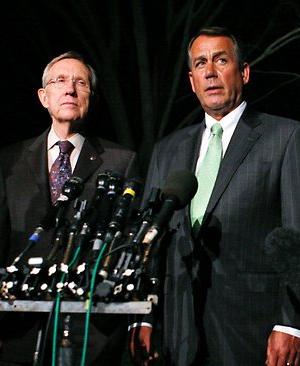The "Historic" 2011 Budget Deal is Meaningless
 | | "I had a 'historic' bowel movement this morning, too" |
According to Lord Edward Cecil, compromise is "an agreement between two men to do what both agree is wrong." This is being displayed right now in Washington, as President Obama promises to address the nation this afternoon on the issue of deficit reform. It is already telegraphed that he will probably propose tax increases on the wealthy and cuts of "waste and fraud" everywhere he can, especially in defense spending. Predictably, Republicans are already firing back, arguing that the only way to deal with the deficit is to drastically cut spending and take serious steps toward entitlement reform. Democrats, on the other hand, argue that the "draconian" cuts being proposed by Republicans will leave children, women, and the elderly on the streets begging for money from oil fatcats who will have stolen every last dime of American money. They also argue that they've already agreed to spending cuts, and on the surface, that appears to be true.
Late last Friday night, after a month and a half of wrangling and six stop-gap "continuing resolutions," Congress and the president finally agreed to a budget for fiscal year 2011, which we're already halfway through. The president and Congressional leaders hailed the agreement as a historic victory for fiscal discipline, even as extremes on both sides of the aisle expressed grave disappointment in their party for caving to the pressures of compromise. We were on the precipice of a government shutdown--which leaders and newscasters assured us would be a terrible thing--and as it seemed to approach with a menacing sense of inevitability, those watching Capitol Hill got to see some of the worst modern American politics has to offer. Each side in the debate tried to paint the other as evil, tried to preemptively assign blame for the shutdown so that they could score political points. The Republicans made outrageous accusations that the Democrats didn't care about the troops while the Democrats made similarly outrageous claims that Republicans wanted to shut down the government because they wanted to kill women. Shameful doesn't even begin to describe it.
 | | Both sides agree that the other side is full of idiots, and both sides are right |
Perhaps this is why, when the deal was finally made (though it hasn't been voted into law yet, I must point out), it seemed like such a landmark accomplishment. Perhaps our leaders actually proved they were capable of finding a middle ground. Indeed, by Lord Cecil's definition, it appears that compromise has been reached. People on both sides are complaining that we've done the wrong thing, even while party leaders defend their deal as the best they could get under the circumstances. However, if you apply a modicum of logic to the details of this compromise, you discover that our political parties have accomplished exactly nothing; the cuts won't stifle the economy or cure the government of its extreme gluttony.
There are a few inconvenient facts that our leaders are keen on not mentioning. For one thing, even under this deal, we are still spending more in fiscal year 2011 than we did in fiscal 2010. Only in Washington can you say we've "cut the budget" while our deficit continues to inflate. The actual "cuts" are only to the president's proposed 2011 budget, not to a comparable budget from 2010. This means two things: (1) if Democrats really believe that deficit spending is the way to fix the economy, then we're still on the road to recovery; and (2) if Republicans believe that the only way to fix the economy is to balance the budget, we're still going in the wrong direction. From the idealogical perspective, absolutely nothing has changed.
 | | By way of comparison, this is what 8% looked like in 1996 |
Another point worth mentioning is that a huge portion of the cuts proposed last week are more accounting than cutting. According to the AP, "lawmakers significantly eased the fiscal pain by pruning money left over from previous years, using accounting sleight of hand and going after programs President Barack Obama had targeted anyway." The best-case scenario for budget hawks put the actual cuts at $20 billion as opposed to $38 billion heralded by Harry Reid, John Boehner, and President Obama.
Finally, there's the matter of perspective. $20 billion is a ridiculously large amount of money, more than just about any of us will ever see in our entire lifetime. However, the projected 2011 budget is roughly $3.8 trillion, which is $1.6 trillion in the red. 20 billion is only 0.5% of 3.8 trillion. In other words, the federal government spent a month and a half coming to an agreement that cuts the amount of money it spends in an average of less than two days.
If one were to satirize the federal government, it would be hard to make it more absurd than it already is. For example, according to Harry Reid, a proposed cut to Title 10 spending (which is largely federal contributions to Planned Parenthood) of somewhere around $300 million would have meant that all the women in the country would be deprived of healthcare. If we could really fund healthcare for half the population for $300 million when we are spending almost $4 trillion, why are we having such vitriolic debates over healthcare? If Reid is correct, we could give healthcare to everyone for 0.015% of our annual budget. Needless to say, this is total nonsense.
This is how it goes with the entirety of the 2011 budget battle. In case I haven't made it clear enough, a cut of an unremarkable $38 billion that isn't even a cut and isn't really $38 billion is like rearranging a few errant hairs on the deckchairs of the Titanic, regardless of which side of the boat you're on. For all the debate, yelling, name-calling, talk of extremism, mud-slinging, and detestable political argument, nothing has fundamentally changed.
 | | "No, seriously, I want to tackle the national debt!" |
But yes, there are more debates in front of us. House Republicans have already come up with a plan for the 2012 budget, which will never be accepted by Senate Democrats or signed into law by President Obama. There's the always contentious debate over raising the debt ceiling, which will inevitably end with an increase in America's credit limit. Then there'll be the 2013 budget and, biggest of all, the 2012 election. Both sides want your vote and they both want to be in control of the message. Everything else is just political theater, because the odds of anything of any import happening while Congress is split between both parties is infinitessimal.
Remember this when President Obama talks today. All he's really interested in is your vote in 2012. Even if you want to argue that he cares about the country (which he probably does), he knows that the only way he'll be able to make real changes from this point on is to see to it that the Republicans lose their House majority and to secure a place in the White House for another four years. However, don't be fooled into thinking he is genuinely concerned about reducing the deficit; that's even more laughable than thinking President G.W. Bush cared about cutting spending. If Obama really wanted to tackle the deficit, he would have listened to the recommendations of his own debt commission and he wouldn't be proposing spending increases across the board to everything under the sun (except defense spending, of course), and he would be working with Congress to make some real cuts, not complaining that they're acting like children and chiding them to "compromise."
-e. magill 4/13/2011
|
|